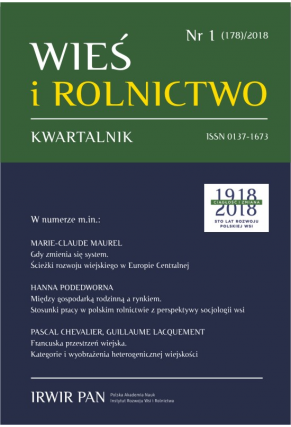Gdy zmienia się system: ścieżki rozwoju wiejskiego w Europie Centralnej
DOI:
https://doi.org/10.53098/wir012018/03Słowa kluczowe:
wiejskość, zmiany systemowe, postkolektywizm, trajektoria, koncepcja zależności od ścieżkiAbstrakt
Niniejszy artykuł przedstawia, na podstawie prac badawczych zrealizowanych w ścisłej współpracy przez Marię Halamską i Marie-Claude Maurel, bilans transformacji ekonomicznej i społecznej w Europie Środkowej w okresie postkolektywistycznym. Po zdefiniowaniu ram poznawczych i metodologicznych wspomnianych badań omówimy etapy, które wyznaczają granice czasowe zmiany systemowej – od odejścia od kolektywizmu aż po rekompozycję terenów wiejskich – ze szczególnym uwzględnieniem różnorodności kierunków rozwoju obszarów wiejskich.
Bibliografia
Chevalier P., Maurel M.-C. (2010). LEADER w krajach Europy Środkowej. Mechanizmy transferu modelu rozwoju lokalnego. Wieś i Rolnictwo, 4 (149), 26–41. DOI: https://doi.org/10.53098/wir.2010.4.149/02
Chevalier P., Maurel M.-C. (2013). The LEADER programme in Central Europe: A new local development policies. Acta Universitatis Lodziensis, Folia Sociologica, 44, 39–52.
Gorzelak G. (1998). Regional and Local Potential for Transformation in Poland. Warszawa: EUROREG.
Halamska M. (1995). La difficile reconversion de l’agriculture étatique en Pologne. Revue d’Etudes comparatives Est-Ouest, 26, 91–118. DOI: https://doi.org/10.3406/receo.1995.2741
Halamska M. (1997). Decollectivisation of agriculture in Central Europe: the first regularities of the process. Eastern European Countryside, 3, 7–19.
Halamska M. (1998). Dekolektywizacja rolnictwa w Europie Środkowej i jej społeczne konsekwencje. Warszawa: Instytut Rozwoju Wsi i Rolnictwa PAN.
Halamska M. (2001). Reprodukcja czy wymiana? Przekształcenia lokalnych elit politycznych w Polsce w latach 1990–1998. Warszawa: Wydawnictwo Naukowe Scholar.
Halamska M. (2008). L’avenir des petites exploitations agricoles et de leurs propriétaires. W: M. Halamska (red.). L’agriculture française et l’agriculture polonaise dans l’Europe de 2007: expériences partagées et intérets communs? (s. 38–56). Varsovie–Paris: Centre de l’Académie Polonaise des Sciences.
Halamska M. (2009). Social capital of rural areas: Attempt at reconstruction. Przegląd Socjo logiczny, 4 (57), 69–94.
Halamska M. (2016a). Processes of change in the social structure of Poland’s rural population in the years 1991–2013. Wieś i Rolnictwo, 4 (173), 81–99. DOI: https://doi.org/10.53098/wir042016/05
Halamska M. (2016b). Struktura społeczno-zawodowa ludności wiejskiej w Polsce i jej przestrzenne zróżnicowanie. Wieś i Rolnictwo, 1 (170), 59–85. DOI: https://doi.org/10.53098/wir012016/04
Halamska M., Lamarche H., Maurel M.-C. (2003). Rolnictwo rodzinne w transformacji postkomunistycznej. Anatomia zmian. Warszawa: Instytut Rozwoju Wsi i Rolnictwa PAN.
Halamska M., Maurel M.-C. (1993). Proces przekształceń lokalnych elit politycznych w Polsce. Wieś i Rolnictwo, 1, 67–93.
Halamska M., Maurel M.-C. (1997). The Farmers of Europe: Differences of views, attitudes, identities. Polish Sociological Review, 1, 59–74.
Halamska M., Maurel M.-C. (2010a). Decollectivisation of agriculture and reshaping of agrarian structure in Central Europe. Przegląd Socjologiczny, 59 (2), 29–56.
Halamska M., Maurel M.-C. (2010b). Les acteurs locaux à l’épreuve du modèle européen. France, Hongrie, Pologne. Praga: CEFRES, Instytut Rozwoju Wsi i Rolnictwa PAN.
Halamska M., Michalska S., Śpiewak R. (2010). LEADER w Polsce. Drogi implementacji programu. Wieś i Rolnictwo, 4 (149), 104–119. DOI: https://doi.org/10.53098/wir.2010.4.149/07
Illner M. (1995). Les conséquences sur le plan territorial du changement politique et économique en République tchèque. Cahiers du CEFRES, 9, 19–36.
Lacquement G., Maurel M.-C., Raynal J.-C. (2011). Trajectoires d’une ruralité recomposée en Europe centrale. Economie rurale, 325–326, 39–53. DOI: https://doi.org/10.4000/economierurale.3234
Lamarche H., Maurel M.-C. (1995). Transitions agraires en Europe centrale. Etudes rurales, Année, 138–140. DOI: https://doi.org/10.3406/rural.1995.3530
Maurel M.-C. (1994). La transition post-collectiviste. Mutations agraires en Europe centrale. Paris: L’Harmattan.
Maurel M.-C. (1997). Stratégies d’appropriation de la terre et du capital dans les agricultures centre-européennes. W: A. Olivier (red.). Původní a noví vlastníci (Anciens et nouveaux propriétaires) (s. 14–24). („Cahiers du CEFRES” nr 11). Praga.
Maurel M.-C. (2004). Les enjeux des mutations des territoires ruraux. L’improbable convergence vers un modèle agricole européen. W: B. Chavance. De la transformation post-socialiste à l’intégration européenne (s. 147–180). Paris: L’Harmattan.
Maurel M.-C. (2005). Temps de recomposition des territoires ruraux en Europe centrale. Retour sur une expérience de terrain. Revue d’études comparatives Est-Ouest, 36 (2), 5–38. DOI: https://doi.org/10.3406/receo.2005.1706
Maurel M.-C. (2012). La grande maille agraire en Europe centrale: un invariant spatio-temporel? Etudes rurales, 190, s. 25–48. DOI: https://doi.org/10.4000/etudesrurales.9664
Maurel M.-C. (2015). From disappearance to recovery: Family farming in Central Europe. Questioning the path dependency hypothesis. Wieś i Rolnictwo, 1, 79–106. DOI: https://doi.org/10.53098/wir.2015.1.1.166.1/05
Maurel, M.-C. (red.) (1994). Les décollectivisations en Europe centrale. T. 2. Itinéraires de privatisation. „Espace Rural”, nr 33, Montpellier.
Maurel M.-C., Chevalier P., Lacquement G. (2014). Transfert et apprentissage du modèle LEADER en Europe centrale. Paris: L’Harmattan.
Maurel M.-C., Halamska M. (2006). Démocratie et gouvernement local dans la Pologne rurale. Paris: CNRS éditions.
Maurel M.-C., Halamska M., Lamarche H. (2003). Le repli paysan. Trajectoires de l’aprèscommunisme en Pologne. Paris: L’Harmattan.
Maurel M.-C., Lacquement G. (2007). Agriculture et ruralité en Europe centrale. Paris: Aux lieux d’être-CEFRES.
Maurel M.-C., Pola P. (2010). L’émergence du développement local le cas de Bóly en Transdanubie méridionale. W: M. Halamska, M.-C. Maurel. Les acteurs locaux à l,épreuve du modèle européen LEADER: France, Hongrie, Pologne (s. 149–184). Prague: CEFRES–Instytut Rozwoju Wsi i Rolnictwa PAN.
Pobrania
Liczba pobrań artykułu
Strony
Jak cytować
Numer
Dział
Licencja
Prawa autorskie (c) 2018 Wieś i Rolnictwo

Utwór dostępny jest na licencji Creative Commons Uznanie autorstwa 4.0 Międzynarodowe.










